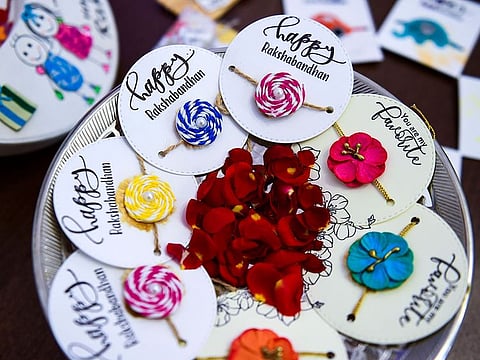Watch: Indian expat siblings mark subdued, eco-friendly Raksha Bandhan in the UAE
Popular Indian festival is a symbol of protection, care between siblings

Also In This Package
Dubai: The Indian community is marking the Hindu festival of Raksha Bandhan in subdued fervour today, with the ongoing COVID-19 pandemic necessitating due social distancing precautions.
Celebrated on the full moon day of the lunar Hindu calendar month of Shraavana, which falls in July-August, Raksha Bandhan, which literally means ‘security bond’, celebrates the bond between a sister and a brother. On this day, a sister anoints her brother with vermilion marks and ties a ‘rakhi’ (an auspicious and decorative thread) around the wrist of the brother and prays for his long life, while the brother pledges to protect his sister. Over the years, this festival has became a symbol of protection and care provided to anyone who may be in need of it — anyone.
Symbolic thread of protection
Mina Jaiswal, a housewife from Bur Dubai, said: “In our home in India, we used to tie ‘rakhi’ on the wrists of all our house helps, that included the gardener, housekeeper, cook and even those who came to do odd jobs as our father encouraged the tradition of brotherhood and benevolence.”
Usually, shops in Bur Dubai display beautiful ‘rakhi’ designs and sweets on the day. However, this year, ‘rakhi’ sales have been low key owing to the pandemic, said many retailers.
Sonal Johar, a mother of three children, Kriyansh, 6, Drishti, 17 and Srishti, 14, said unlike other years, this Raksha Bandhan, the family did not intend to invite distant relatives or step out of their home. “It’s summer holidays for my kids, but we have not planned anything big. Every Raksha Bandhan, the festival meant a family outing, dinner and games. This year, my daughters will tie the ‘rakhi’ on the wrist of their brother, but we have not invited our extended family members. We are strictly observing the COVID-19 protocols. Last year, there was a lockdown around this time. That’s not the case rhis year, but the celebrations will be subdued.”
Indian families are not only celebrating the festival in a quieter way, but they are also looking for more sustainable and eco-friendly ‘rakhi’ threads.
Vibhuti Verma, an Indian expat, has capitalised on the needs of the market and come up with innovative and sustainable hand-made ‘rakhis’ that are made from recycled fabric, organic material. She has even created a ‘rakhi’ that can be planted into the soil to be grown into a small flowering shrub.
Verma told Gulf News: “The current pandemic has taught us to be more innovative and resourceful and that is why since last year, I have devoted my energies to creating a line of products for festivals such as Diwali, Christmas and now Raksha Bandhan that will help people usher in the festivities in a more eco-friendly manner.”
Verma, with the help of her creative team back in India, created ‘rakhis’ out of textile scrap from traditional folk and handicraft manufacturing units. “They always had a lot of left-over small pieces of fabric. So, we retrieved those to make ‘rakhis’ from them. We collect the scrap, clean and sanitise them and then create beautiful ‘rakhis’ embellished with tassels and ‘zari’ pieces,” she revealed.
Verma has also created small, felt ‘rakhis’ cut in the shapes of flowers, elephants, motor cars that serve as fascinating toys for children. She has crafted plantable ‘rakhis’ that contain biodegradable paper and seeds of flowers like sunflower, which can be sown into the soil and have a new lease of life.
“I feel it is important this year to honour the circle of life and every article we use can have an extended second life and be recycled. This helps us honour Mother Earth,” Verma explained.
Sign up for the Daily Briefing
Get the latest news and updates straight to your inbox








